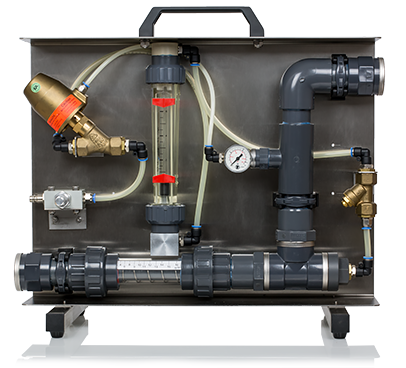Carborain
Reliable prevention of sunburn
Climate change has not spared orchards in central Europe and increasingly leads to sunburn damage on fruit and leaves. In 2003 and 2004 crop failures of up to 50% were reported.
The main cause of sunburn is high fruit temperatures often exceeding 40°C, which significantly limits growth and damages fruit. Depending on the fruit, the sides facing the sun can often develop bright, red, or brownish spots. This causes fruits and vegetables to become unpalatable and thus unfit for sale. In order to reliably avoid sunburn, several hours of constant or intermittent overhead sprinklers are applied in orchards starting at midday, which can cool temperatures of 40°C and more down to under 28°C. This cooling irrigation will likely be needed more often in the future in order to avoid sunburn damage and prevent profit loss.
Irrigation with hard water – no problem
Cooling irrigation was previously limited to soft water because hard water quickly leads to calcification on leaves and fruits. This greatly inhibits photosynthesis and therefore fruit growth due to limescale deposits on the leaves. In effect, the plants stand in a “shadow of limescale” and receive less light. The sale price of fruits is also adversely affected by calcification.
Limescale deposits can be reliably prevented with Carboraint

Calcification after irrigation – left other device and right with Carborain
How does Carborain work
Existing calcification deposits are slowly dissolved by Carborain and never even develop on new leaves and fruits. This effect is achieved through carbon dioxide gas (CO2) and the resulting carbonic acid (H2CO3) added to the water by the Carborain device. This slightly decreases the pH value of the water and significantly increases the water’s dissolving power for carbonates. For example, the dissolving power for calcium is increased from ca. 15 mg/l in non-carbonated water to over 1,050 mg/l with sufficient carbon dioxide content. The calcium remains in the solution and cannot form deposits. Thanks to Carborain, the benefits of cooling irrigation can now also be used in areas with hard water. Ms. Susanne Früh, agricultural adviser from fruit wholesaler Mittelbaden, has recommended Carborain for cooling irrigation since 2006 due to very good experiences.
The main advantages of Carborain at a glance
- no calcium deposits on fruit and leaves
- no calcium deposits on fruit and leaves
- low investment costs
- easy and safe to use
- environmentally friendly
Other advantages of Carborain technology
- No more limescale on misters and pipes
The entire irrigation system is spared from calcium deposits, eliminating the need for costly and environmentally harmful cleaning of misters and pipes. - natural, weak acid
Carbonic acid is a natural acid and is found in large amounts in mineral water, for example. Harmful overdosing, as with acids, is not possible. Carbonic acid is completely harmless for plants and even offers many benefits. - better nutrient absorption
Plant growth is positively influenced by improved nutrient absorption with a lower pH value. This leads to increased yields for users. - greater effectiveness of plant protective agents
Spray mixtures are more effective with Carborain due to the lower pH value.
Technical data
| Mounting station | directly in the main line or as a by-pass |
| Litre output (l/h) | 3.000 – 15.000 (30.000) |
| Maximum CO2 dosing (g/l) | 1,0 |
| Pressure loss at maximum output (bar) | 1,0 |
| Dimensions (L x H x D) (cm) | 55 x 45 x 30 |
| Weight (kg) | 10 |
| Water connections | 1¼” female screw thread at input and output |
We also offer higher outputs upon request.
